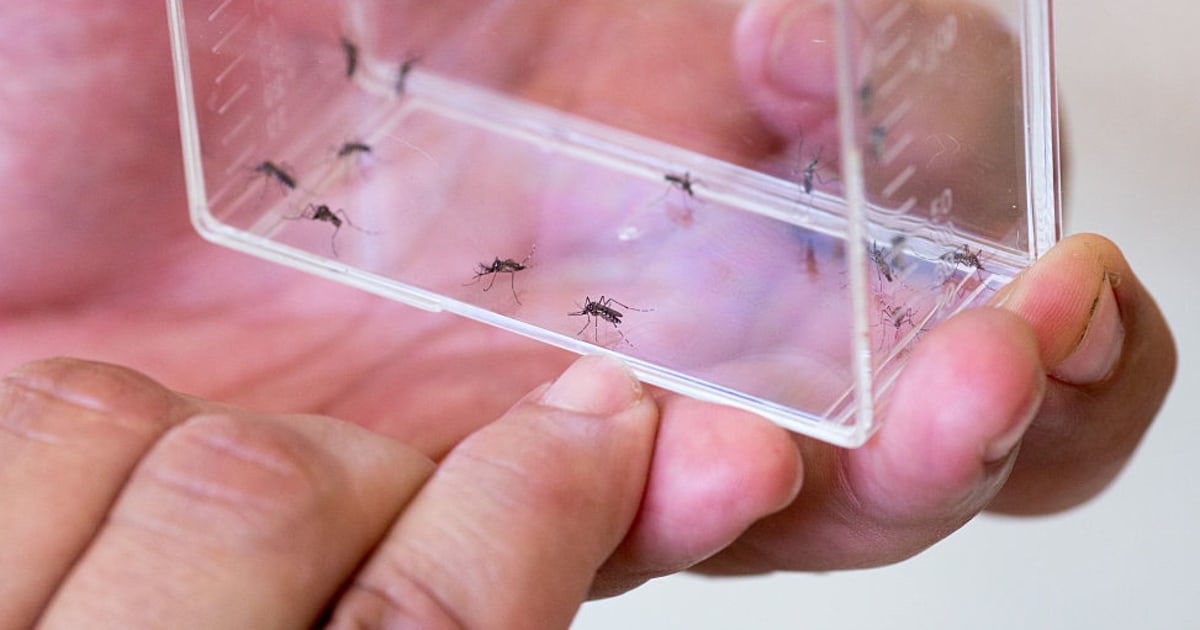In the Google search engine, queries related to
dengue
are on the rise.
What are the symptoms?
How long do they take to appear?
How is the mosquito that transmits it?
Consultations grow in parallel to the increase in cases registered in recent weeks in Argentina and countries in the region.
In Argentina, 9,388 cases of dengue
have been reported so far this year
, according to the latest epidemiological bulletin issued by the Ministry of Health (which contains data collected up to March 19).
In the last four weeks alone, 8,000 had been reported, with an average of
2,000 cases per week
.
"In relation to previous years, the cases registered in the current season are
above what was expected
with respect to those registered in recent years, with the exception of the year 2020 compared to which the cases are located 30% below the number accumulated that year for week 11," the report states.
In 2020, coinciding with the start of the COVID-19 pandemic, our country experienced the largest dengue epidemic since the reemergence of the disease in 1998.
So far, according to the health portfolio, the circulation of the virus has been identified in
13 jurisdictions
: Buenos Aires, the Autonomous City of Buenos Aires, Catamarca, Corrientes, Córdoba, Entre Ríos, Formosa, Jujuy, Salta, Santa Fe, Santiago del Estero and Tucuman.
What is dengue?
Dengue is a viral disease transmitted by mosquitoes, mainly the
Aedes aegypti
.
When the insect feeds on the blood of a person infected with the virus, it acquires it and after 8 to 12 days it is capable of
transmitting it to a healthy person
through its bite.
Transmission from humans to mosquitoes can occur from 2 days before the onset of disease symptoms and
up to 2 days after resolution of fever
.
Two valid clarifications: dengue is not the mosquito, but the disease.
The bite of an
Aedes aegypti
does not in itself imply contracting the virus: the mosquito
must be infected
in order to transmit it.
How to differentiate the mosquito that transmits dengue from the "common" mosquito?
What we know as the "common mosquito" is
Culex pipiens
and other members of the
Culex
family .
It is the one that usually startles us at night
by buzzing near our ears
and that when biting leaves large welts (in several cases, more than one).
It is light brown and on each segment of the abdomen it has a lighter beige line.
Its legs are dark and uniform in color.
It can also transmit serious diseases, but
it is not the vector for dengue
.
The dengue vector belongs to the
Aedes (aegypti and albopictus)
family .
Unlike the common mosquito,
it is black with stripes and white spots
on its legs and thorax.
It usually bites
during the morning and afternoon
, before it gets dark.
The
Aedes
are subtle in their flight, they move below, they are very attracted to the feet.
They are not heard because they do not usually get close to the head, they explained to
Clarín
from the Mosquito Study Group (GEM) of the Faculty of Exact and Natural Sciences of the University of Buenos Aires.
In order to lay their eggs and reproduce, the
Aedes aegypti
needs artificial containers with water such as bottles, jars, covers, pot dishes, vases, pet drinkers, cups with plant roots, even soda caps;
any accumulation of water
, no matter how small, is enough.
It does not lay its eggs in puddles, ditches, rivers or lagoons.
It is raised in houses, establishments and its surroundings (in the peridomicilio) throughout the country.
It flies short distances, so if you come into contact with one it means that
there is a hatchery nearby
.
What are the symptoms of dengue?
The symptoms with which dengue can manifest are: Fever accompanied by one or more of the following symptoms:
Pain behind the eyes, headache, muscle and joint pain
nausea and vomiting
intense tiredness
Appearance of spots on the skin
Itching and/or bleeding from the nose and gums
How long do dengue symptoms take to appear?
"The incubation period is
up to 15 days
, on average 7, since the mosquito bites me, inoculates me with the virus and I start with the symptoms,"
the infectious disease doctor Tomás Orduna, former head of Tropical and Traveler Medicine , responded to
Clarín
. from Muniz Hospital.
Dengue incubation times are very similar to those of the Zika and Chikungunya viruses, diseases also transmitted by
Aedes aegypti
.
What to do and what not to do when dengue symptoms appear?
The Ministry of Health emphasizes that people who show symptoms compatible with dengue should
immediately go to a hospital
or health center.
They also highlight the importance of not self-medicating when these warning signs appear.
"
Do not take aspirin, ibuprofen
, or apply injectable medications. It is best to consult your doctor so that he can indicate the appropriate medication," they warn.
How is the treatment of dengue?
Dengue is treated with drugs that relieve pain, but at the moment
there is no specific treatment
.
The approach is fundamentally focused on controlling the symptoms.
"Infected people are recommended to drink plenty of water to replenish fluids and
carry out daily medical control and monitoring
," the health authorities specify.
Pain behind the eyes is one of the symptoms of dengue.
Photo Shutterstock.
Severe dengue: who is most at risk and what are the symptoms?
The majority of people who contract dengue do not develop symptoms, the World Health Organization (WHO) points out.
In most cases,
the person is cured in one to two weeks
, but sometimes the disease becomes severe and requires hospitalization.
And in the most serious cases, dengue can cause death.
People who
are infected a second time
are at higher risk of the disease becoming more severe.
A recent WHO article points out that the symptoms of severe dengue usually appear when the fever disappears and are the following:
severe abdominal pain
persistent vomiting
accelerated breathing
bleeding gums or nose
fatigue
agitation
vomit or bloody stools
intense thirst
pale cold skin general weakness.
"Those people who have been infected with dengue before, in the presence of symptoms, it is recommended that they consult early and
report that they had the disease
so that medical teams can identify the possibility of severe dengue and provide the necessary care," they emphasize from the Ministry of Health.
Once recovered, they may feel
tired for several weeks
.
Is there a vaccine for dengue?
Currently there is no vaccine available for dengue in Argentina.
However, a new vaccine developed by the Takeda laboratory, which was recently authorized in Brazil, is in the process of being registered with ANMAT.
"
For this season it will not arrive
. For the 23-24 season it is possible that we already have that vaccine," Orduna estimates.
The doctor, who is a member of the Latin American Society of Travel Medicine (SLAMVI) and the Argentine Society of Infectious Diseases (SADI), suggested that, once authorized, it will probably first be available in private vaccination centers.
"And then we will see what the
strategy is from public health policy
, because it is not easy. The implementation of these vaccines is a fairly complex issue," he admitted.
"At some point it will begin in some regions, in some population groups and, in the future, it may be expanded depending on the strategy that will have to be designed," she estimated.
How is dengue prevented?
The most effective measure to prevent dengue is to eliminate breeding sites where the mosquito that acts as a
"vehicle" of the virus
reproduces .
And at times like the one we are going through, with cases on the rise, it is also essential to avoid bites.
How to avoid the bite of the mosquito that transmits dengue:
Place mosquito nets on the windows and doors of the houses.
Use repellents containing DEET on exposed skin and clothing with applications every 3 hours.
In boys and girls it is recommended that repellents do not have more than 30% DEET.
Wear long sleeves and long pants in outdoor activities.
Use repellent spirals or tablets at home.
Tips to prevent mosquito reproduction:
Avoid throwing containers or rubbish in places such as patios, terraces, streets and vacant lots, where water can accumulate.
Keep yards and gardens weeded and unclog roof rain drains.
Remove water from holes in trees, rocks, walls, wells, abandoned latrines, and fill in holes in walls and walls where rainwater can collect.
Bury or eliminate all types of garbage or useless containers such as cans, shells, tires and other objects that can store water.
Sort useful containers that can accumulate water, turning them upside down or putting a lid on them.
Keep tanks and containers used to collect water covered.
Eliminate water from dishes and flower pots, air conditioning or rain drain collectors, inside and outside the house.
Keep swimming pools clean, chlorinated or empty in the off-season.
Chikungunya in Argentina
So far this year,
more than 500 cases of chikungunya fever
have also been reported in the country.
The circulation of the virus was confirmed in five jurisdictions: Buenos Aires, City of Buenos Aires, Corrientes, Córdoba and Formosa.
Chikungunya fever is also a viral disease transmitted by the bite of infected
Aedes aegypti
mosquitoes .
Symptoms usually start 3-7 days after being bitten.
The most common symptom is a sudden onset of
fever over 38°
, often accompanied by joint pain.
"Other symptoms that may appear are: muscle pain, headache, nausea, fatigue, and skin rash. Severe joint pain usually lasts a few days, but can persist for months, affecting full recovery and return to daily activities", warned from the health portfolio.
***
➪ Do you have any questions about health and well-being that you would like us to address in section notes?
Enter the Clarín Help Center by clicking here, enter
Message to the newsroom
and then
Questions to Buena Vida
.
Write us your query and send.
Done!
look too
Keto diet: what it consists of and why they warn about risks to the heart
World Sleep Day: Is it possible to sleep well after 60?









